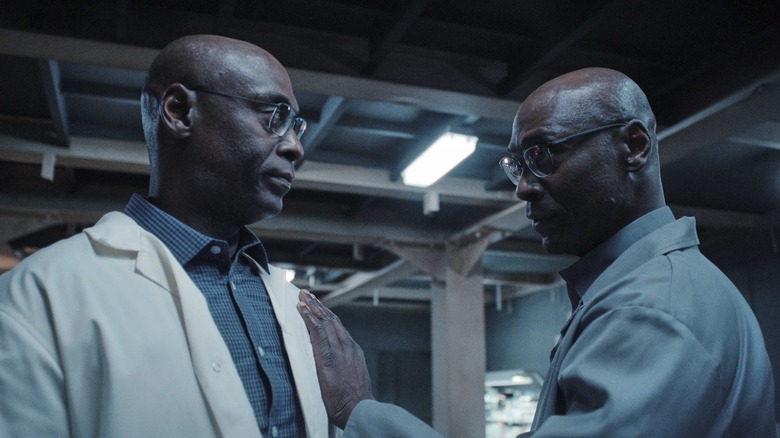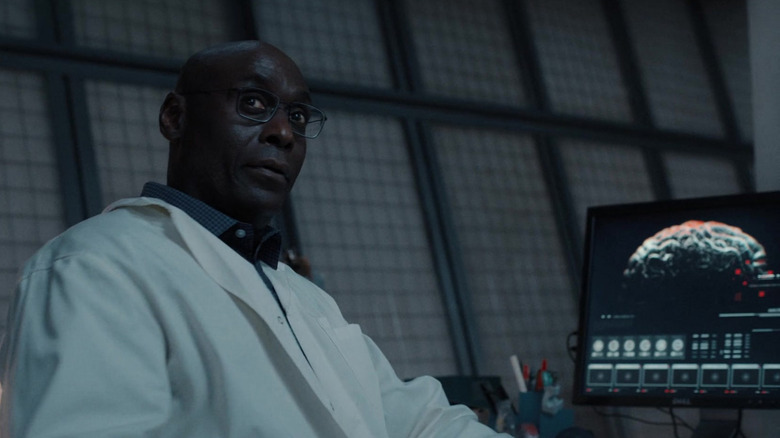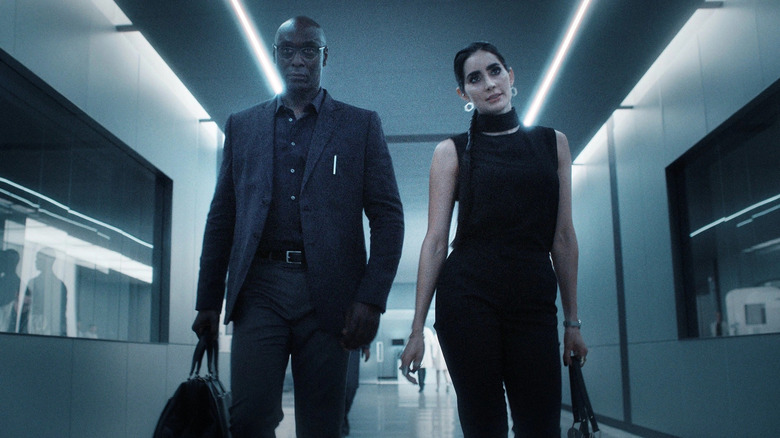How Lance Reddick Handled Playing Multiple Weskers In Netflix's Resident Evil
The "Resident Evil" video game franchise is vast and complicated and has more entries than even its most hardcore fans might be aware of. As a compliment to the games' expansive pop culture presence, they have also been adapted into seven live-action feature films, four animated feature films, and two TV shows. The most recent "Resident Evil" adaptation was the high-budget, high-profile Netflix TV series that was released on July 14, 2022. Viewership was middling, reviews were warm, and the series was swiftly canceled after only eight episodes. While the series was wild and weird — like the games — it didn't find a good focal point, spreading its story over two timelines that didn't always organically intersect.
Half of "Resident Evil" took place in 2036, years after a viral infection leaked out into the world, creating zombie hoards, giant mutant animals, and the collapse of society; only 300 million humans remain alive on the planet. In 2036, two estranged sisters (Ella Balinka and Adeline Rudolph) fight to reunite, but one or both of them may have been corrupted by their dealings with the evil Umbrella Corporation that unleashed the virus. The other half of "Resident Evil" took place in 2022, wherein the same two sisters (Tamara Smart and Siena Agudong) slowly learn about how their father (the late Lance Reddick), an Umbrella employee, has been conducting unsavory viral experiments.
Part of Umbrella's sinister plan also involved cloning, and Reddick, over the course of the series, appears as several clones of himself, each one with a different personality. In a 2022 interview with SyFy, Reddick talked about his various characters, and how he chose to differentiate them in his performance.
Al, Bert, Alby, and Albert
All told, Lance Reddick plays four different roles in "Resident Evil." There is Albert Wesker, the one who raised the show's teen protagonists Jade and Billie, maybe not for the most savory purposes (he is secretly harvesting their blood). Albert has given himself superhuman abilities, and can fight off Umbrella agents who wonder why he secretly created three clones of himself. Bert Wesker, one of the clones, ends up slipping out of Umbrella to reveal the truth to Jade and Billie. Bert is usually polite and even chirpy, but becomes violently angry in a flash (a result of his cloned brain). Al and Alby Wesker also appear, and all four work in a research and development lab together. There are even multiple scenes where all four Reddicks interact.
Reddick, who had to familiarize with the lore of the many "Resident Evil" video games, knew to construct the Albert characters in such a way that would do justice to the role his character played in the games. He knew that at least one of them had to be the video game version, merely in live-action, and played the part thusly. He said of his roles:
"I'm calling him O.G. Wesker, basically the Wesker from the games. [...] It's Albert's story. But once Bert came in, he was almost such a different character that I felt I had to find him so he wasn't a spin-off of Albert. [...] In terms of personality types, if Albert is the oldest — the hyper-responsible one — and Bert's the youngest who is kind of a slob, 'Whatever man, I'll get to it,' Alby is the middle one who just wants everybody to make peace. So, that's how I approached the three of them."
The Chronicles of Reddick
The character of Alby appeared in "Resident Evil" the least, only showing up in a few key scenes. Given how little time Lance Reddick had to play Alby, he had the most trouble defining that character. He also talked about the difficulties of creating a human, believable character in a universe as wild as "Resident Evil." In a world of corporate conspiracies, clones, zombies, and mutants, how does one play a villainous character without tilting into caricature? Reddick said he found a good balance:
"In some ways, even though he was the least prominent of the characters and he was only in one scene, he was the hardest character for me to define was Alby. What was hard about [O.G. Wesker] is that, because he's so iconic and such a particular type of thing, the biggest challenge there was to make him three-dimensional and not a two-dimensional mustache-twirling villain. [...] [He is] so hyper-alpha and almost a pure psychopath with no conscience."
Ultimately, the "Resident Evil" TV series couldn't decide if it wanted to be a post-apocalyptic zombie thriller or a pre-apocalyptic conspiracy thriller, and weakened itself by splitting the difference. The 2022 sequences were, however, the stronger part of the series, and a large park of why it worked as well as it did was the presence of Reddick. Even in a strange and confusing world like that of "Resident Evil," he sought to find the emotional cores of his characters.
R.I.P. Lance Reddick. He was the real deal.


